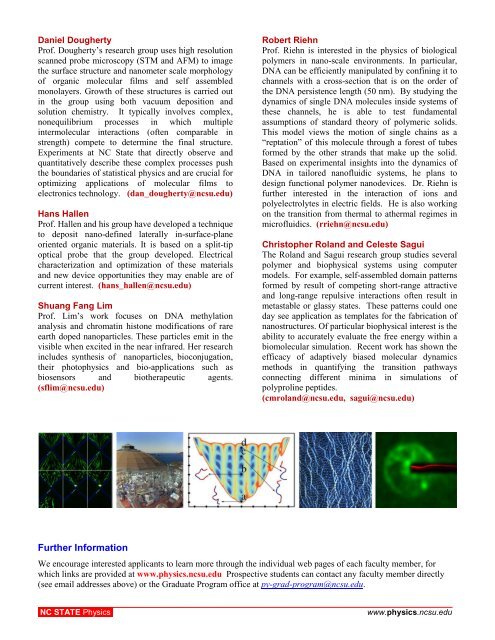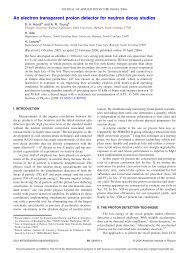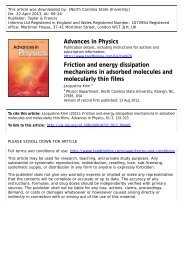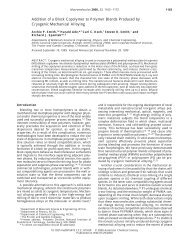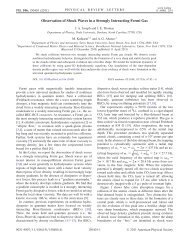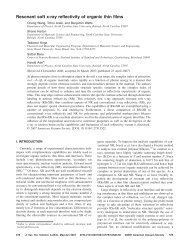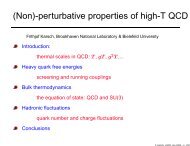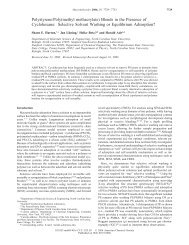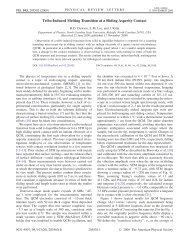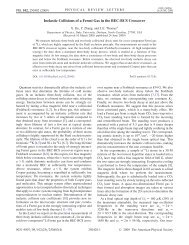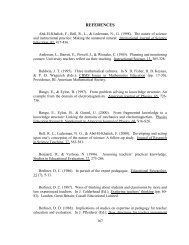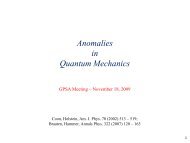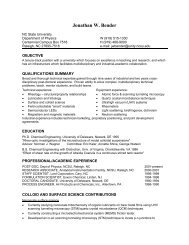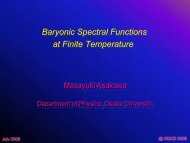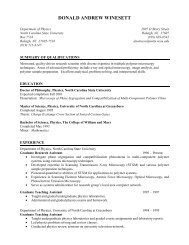Physics Graduate Brochure - Physics - North Carolina State University
Physics Graduate Brochure - Physics - North Carolina State University
Physics Graduate Brochure - Physics - North Carolina State University
Create successful ePaper yourself
Turn your PDF publications into a flip-book with our unique Google optimized e-Paper software.
Daniel Dougherty<br />
Prof. Dougherty’s research group uses high resolution<br />
scanned probe microscopy (STM and AFM) to image<br />
the surface structure and nanometer scale morphology<br />
of organic molecular films and self assembled<br />
monolayers. Growth of these structures is carried out<br />
in the group using both vacuum deposition and<br />
solution chemistry. It typically involves complex,<br />
nonequilibrium processes in which multiple<br />
intermolecular interactions (often comparable in<br />
strength) compete to determine the final structure.<br />
Experiments at NC <strong>State</strong> that directly observe and<br />
quantitatively describe these complex processes push<br />
the boundaries of statistical physics and are crucial for<br />
optimizing applications of molecular films to<br />
electronics technology. (dan_dougherty@ncsu.edu)<br />
Hans Hallen<br />
Prof. Hallen and his group have developed a technique<br />
to deposit nano-defined laterally in-surface-plane<br />
oriented organic materials. It is based on a split-tip<br />
optical probe that the group developed. Electrical<br />
characterization and optimization of these materials<br />
and new device opportunities they may enable are of<br />
current interest. (hans_hallen@ncsu.edu)<br />
Shuang Fang Lim<br />
Prof. Lim’s work focuses on DNA methylation<br />
analysis and chromatin histone modifications of rare<br />
earth doped nanoparticles. These particles emit in the<br />
visible when excited in the near infrared. Her research<br />
includes synthesis of nanoparticles, bioconjugation,<br />
their photophysics and bio-applications such as<br />
biosensors and biotherapeutic agents.<br />
(sflim@ncsu.edu)<br />
Robert Riehn<br />
Prof. Riehn is interested in the physics of biological<br />
polymers in nano-scale environments. In particular,<br />
DNA can be efficiently manipulated by confining it to<br />
channels with a cross-section that is on the order of<br />
the DNA persistence length (50 nm). By studying the<br />
dynamics of single DNA molecules inside systems of<br />
these channels, he is able to test fundamental<br />
assumptions of standard theory of polymeric solids.<br />
This model views the motion of single chains as a<br />
“reptation” of this molecule through a forest of tubes<br />
formed by the other strands that make up the solid.<br />
Based on experimental insights into the dynamics of<br />
DNA in tailored nanofluidic systems, he plans to<br />
design functional polymer nanodevices. Dr. Riehn is<br />
further interested in the interaction of ions and<br />
polyelectrolytes in electric fields. He is also working<br />
on the transition from thermal to athermal regimes in<br />
microfluidics. (rriehn@ncsu.edu)<br />
Christopher Roland and Celeste Sagui<br />
The Roland and Sagui research group studies several<br />
polymer and biophysical systems using computer<br />
models. For example, self-assembled domain patterns<br />
formed by result of competing short-range attractive<br />
and long-range repulsive interactions often result in<br />
metastable or glassy states. These patterns could one<br />
day see application as templates for the fabrication of<br />
nanostructures. Of particular biophysical interest is the<br />
ability to accurately evaluate the free energy within a<br />
biomolecular simulation. Recent work has shown the<br />
efficacy of adaptively biased molecular dynamics<br />
methods in quantifying the transition pathways<br />
connecting different minima in simulations of<br />
polyproline peptides.<br />
(cmroland@ncsu.edu, sagui@ncsu.edu)<br />
Further Information<br />
We encourage interested applicants to learn more through the individual web pages of each faculty member, for<br />
which links are provided at www.physics.ncsu.edu Prospective students can contact any faculty member directly<br />
(see email addresses above) or the <strong>Graduate</strong> Program office at py-grad-program@ncsu.edu.<br />
.NC STATE <strong>Physics</strong>.<br />
www.physics.ncsu.edu


